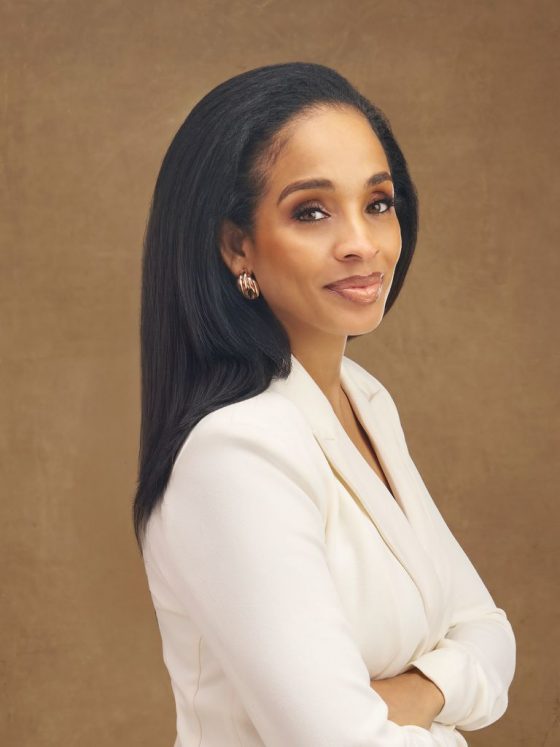Dr Tinuade Sanda is the first female managing director and CEO of Eko Electric Distribution Firm, Nigeria’s largest power distribution firm. She was a key member of the privatisation team that examined Eko Electricity Distribution’s finances and taxes and ascended through the ranks to become Chief Finance Officer and Chief Treasury Officer before being named the Disco’s first female Managing Director and Chief Executive Officer in 2022. In this interview, she discusses gender equality in the workplace, the audacious actions she took to climb the ranks to become an authority in the financial and power sectors, as well as the efforts she is making to ensure that her tenure as CEO is filled with innovations and advancements in the power industry.


What led you to this career path in the power distribution sector?
I joined West Power Gas in 2013 as the Chief Financial Officer, transitioning from Vanguard Energy Source after a 9-year tenure at Access Bank. With a background deeply rooted in finance and a relentless passion for driving economic growth, I assumed the role of CFO at West Power & Gas. Given my extensive experience, I was selected to be part of the leadership team for the acquisition of EKO Disco in 2013. As you are aware, I now lead the company as its MD/CEO.
My journey into the power distribution sector was fuelled by my passion for economic growth, leveraging my past experiences and financial expertise. The goal was to contribute to critical infrastructure development, particularly in ensuring a reliable power supply that would, in turn, stimulate economic growth within Nigeria. This opportunity aligned with my long-standing commitment to making a meaningful impact through strategic financial leadership.
You are an accountant in the engineering sector of a male-dominated industry. Tell us a few of the biggest obstacles or challenges you’ve had to overcome while working in the industry.
Navigating the professional landscape as an accountant in an industry traditionally dominated by males, I faced significant challenges associated with breaking through prevailing gender stereotypes. Overcoming these challenges involved actively demonstrating my competence and capabilities. This required a concerted effort to deliver tangible results and gain recognition based on expertise. To ensure my success in this male-dominated sector, I adopted a multifaceted approach. Firstly, I actively participated in financial discussions, leveraging my accounting background to contribute meaningfully to conversations related to the industry’s financial aspects. Simultaneously, I delved into non-financial talks, seeking a comprehensive understanding of the broader industry dynamics. By engaging in both financial and non-financial spheres, I aimed to establish a well-rounded presence and demonstrate that gender should not be a limiting factor in professional capabilities. Throughout this process, I adhered to the principle that competence is powerful; tangible results and proficiency speak louder than any preconceived notions or biases. This approach helped not only to break down gender barriers but also to foster an environment where my contributions were acknowledged and respected based on merit. As I have always maintained, competence speaks for itself, and no one disputes that.



Why do you think the industry, in its current state, has less female representation? Do you see this increasing at all?
The under-representation of women in the power sector may have historical roots and, at times, may tie into a reluctance to take on certain roles. However, there’s an increasingly positive shift in perspectives, demonstrating the potential for increased female participation. As women assume leadership roles, it sets a precedent for broader inclusion. In my journey, becoming the first female MD/CEO at EKO Disco marked a significant milestone, and we’ve actively promoted more women to top management positions. Notably, the recent ground-breaking achievement of Engr. Mrs. Margaret Aina Oguntala, breaking a 65-year tradition of male engineers as presidents of a prestigious association, exemplifies the changing landscape. Her accomplishment is inspiring and illustrates that women are increasingly stepping into influential roles in the engineering field. This trend reflects a broader societal shift towards recognising and empowering women in traditionally male-dominated industries.
How can we promote more gender inclusion in the power sector, especially now that you, a woman, sit at the top of the biggest power distribution chain?
Gender inclusion can be advanced through deliberate recruitment strategies, mentorship initiatives, and projects highlighting the achievements of women in the sector. As a female leader, I actively champion policies cultivating diversity and equal opportunities. One concrete step I have taken towards fostering gender inclusion is launching my personal mentorship programme, EmHERging, which is tailored for young female professionals. This programme is designed to empower them with the essential resources needed to navigate their career paths and ascend to leadership positions.
Also, deliberate recruitment strategies and projects showcasing women’s achievements play a crucial role in advancing gender inclusion; this includes actively seeking diversity in the recruitment process, which ensures a broader pool of talented individuals. It also entails deliberately considering candidates from diverse backgrounds, including women, to enable organisations to benefit from a richer array of perspectives and skills.

Since you assumed office as MD/CEO, what significant marks and strides have you been able to achieve?
Since assuming office, we have implemented efficient operational strategies, improved customer service, and initiated innovative projects like metering programs. We have enhanced reliability and are committed to further advancements. Notably, these include the record of the lowest-ever ATC&C of 15.69% in July 2022, showcasing financial growth via our collection increase to over N16.8bn, and the launch of the fast-delivery mass metering programme (Mobile MAP Initiative), resulting in the delivery of over 80,832 meters.
Other accomplishments include our deliberate strategy to purchase statistical meters for the monitoring of all existing feeders, which effectively reduces losses; securing 150 transformers to address overloaded transformers; the commencement and implementation of feeder remote terminal units for monitoring of transformers; the initiation of round-the-clock technical shifts for Island and Lekki districts; and the commencement of the evacuation of 100 MW from NDPHC, which significantly improves EKEDP’s power supply reliability. In addition, we conducted extensive rehabilitation of 51 high-trip feeders across the network and had selected feeders with high collection efficiencies. We also achieved a 2023 year-to-date complaint resolution of 99.2%, despite a 35.8% increase in the number of customer complaints.
I also focused on staff welfare and ensured the completion of the 2020 and 2021 conversion exercises with the upgrade of 103 and 101 employees, respectively. I also introduced monthly incentives, boosting both commercial and technical performances. In addition, I implemented a 25% upward review of staff remuneration in recognition of our team’s pivotal role.
Since my assumption of office, the company has attained the recertification of ISO-OHM&MS 45001:2018, reflecting our commitment to occupational health and safety; we also attained ISO 27001 certification in information security, reinforcing our commitment to data protection; and the ISO 9001-2015 certification in Quality Management Systems.
We can’t talk about the power and electric distribution supply in Nigeria without talking about the abysmal power supply throughout the country, which has been going on for years. What exactly is the cause of the low power supply, and how can this be fixed?
The abysmal power supply in Nigeria stems from a combination of factors, and addressing them comprehensively is crucial for improvement. Firstly, generation capacity shortfalls are a key challenge, with inadequate power generation capacity remaining a fundamental issue. This is further worsened by ageing power plants, a lack of maintenance, and insufficient investment in new facilities, all contributing to the shortfall.
Secondly, infrastructure decay is another inherited or legacy issue we contend with, as we are continuously rehabilitating ageing and poorly maintained transmission and distribution infrastructure, which leads to losses and inefficiencies in our technical operations. These result in frequent breakdowns and outages in the power grid and further reduce supply reliability.


Thirdly, many power plants rely on gas as a primary fuel source, and the attendant gas supply disruptions significantly contribute to power shortages. The inconsistent fuel availability and supply chain issues affect the operational efficiency of power plants.
The financial constraints are also part of the challenges. The power sector faces financial challenges, with issues such as liquidity problems, debt accumulation, and shortfalls from non-cost reflective tariffs. These financial constraints impact the sector’s ability to invest in infrastructure upgrades and maintenance.
Regulatory uncertainties and policy inconsistencies affect investor confidence in the power sector, as frequent policy changes create challenges for long-term planning and execution.
Technical losses in the transmission and distribution networks contribute to overall inefficiency. Energy theft (unauthorised and illegal connections) exacerbates losses and undermines revenue collection, leading to increased ATC&C losses. All these continue to affect the power supply and our service levels.
Now, talking about possible solutions, we need investments in new generation capacity by encouraging private and public investments in new power generation projects. Partnerships with international organisations would boost funding for capacity expansion. Other solutions include Infrastructure Upgrade and Maintenance, diversification of Fuel Sources, Financial Reforms, and enabling DisCos to charge cost-reflective tariffs, which will allow some liquidity to pay other market participants including the GenCos, Gas Suppliers, Market Operator, Public-private Partnerships to attract investments and improve financial viability, establishment of a stable regulatory environment to build investor confidence, implementation of loss reduction and prevention measures to reduce technical and non-technical losses in the transmission and distribution networks, enforcement against electricity theft and illegal connections, capacity Building and Training, and others.
Addressing the abysmal power supply in Nigeria requires a multifaceted approach, combining investments, policy reforms, and improved operational efficiency across the entire power sector value chain.


It’s a new year, and the EKEDC must have goals and targets set out for the year; what are they, and how are you, as the CEO, going to make sure these targets are met?
The EKEDC’s goals for the year include adopting innovative ways of improving power supply despite current grid challenges and constraints, expanding metering coverage, enhancing grid infrastructure, and implementing customer-centric solutions.
My role involves overseeing strategic execution and optimising resources for goal achievement. In 2024, the focus will remain on excellence, continuous employee welfare, and motivation, with a pivotal project being the STS meter migration. The seamless migration to this new platform is crucial, ensuring that all customers, including those without eligible meters, can swiftly apply for and receive new meters, emphasising efficiency and customer satisfaction.
What is the most important piece of advice you’ve been given in your career?
A particularly memorable and key piece of advice from a seasoned industry practitioner emphasised the importance of resilience in meeting challenges, continual learning, and leading with integrity. I was encouraged to fearlessly seek help and maintain flexibility in strategy by being open to returning to the drawing board as needed.
What is your favourite part of the job?
My favourite aspect of the job is witnessing the positive impact of what we do on our esteemed customers and the people I am privileged to lead. As previously mentioned, my passion lies in improving economic conditions. Specifically, I find fulfilment in enhancing the quality of life through reliable power supply and empowering our workforce.
What advice do you have for a woman starting her career in the power sector?
For women starting their careers, my advice is to be confident, stay committed to learning (as confidence is borne from knowledge of your industry and space), and embrace challenges as opportunities for growth. Seek mentorship and actively contribute to intentionally shaping your career path.



















